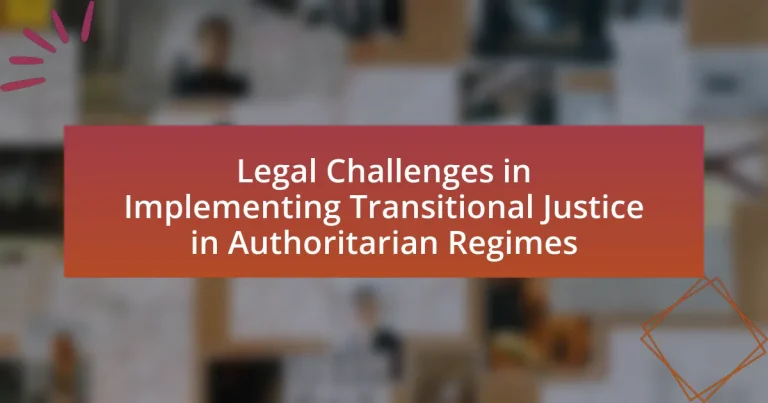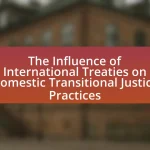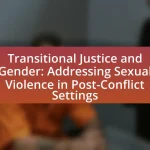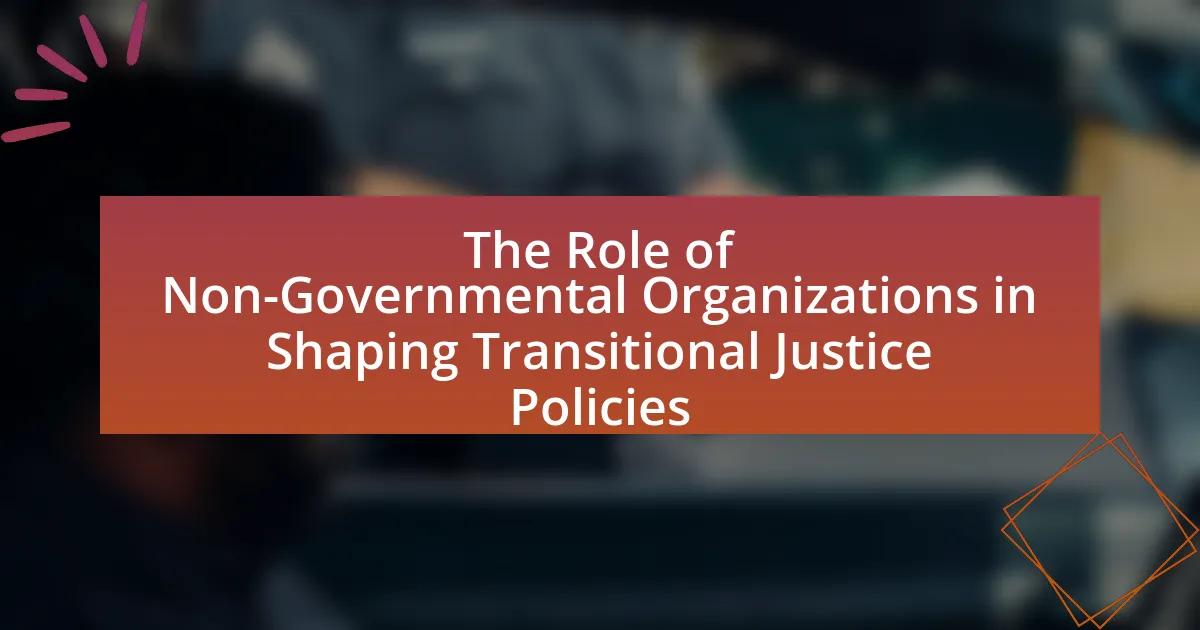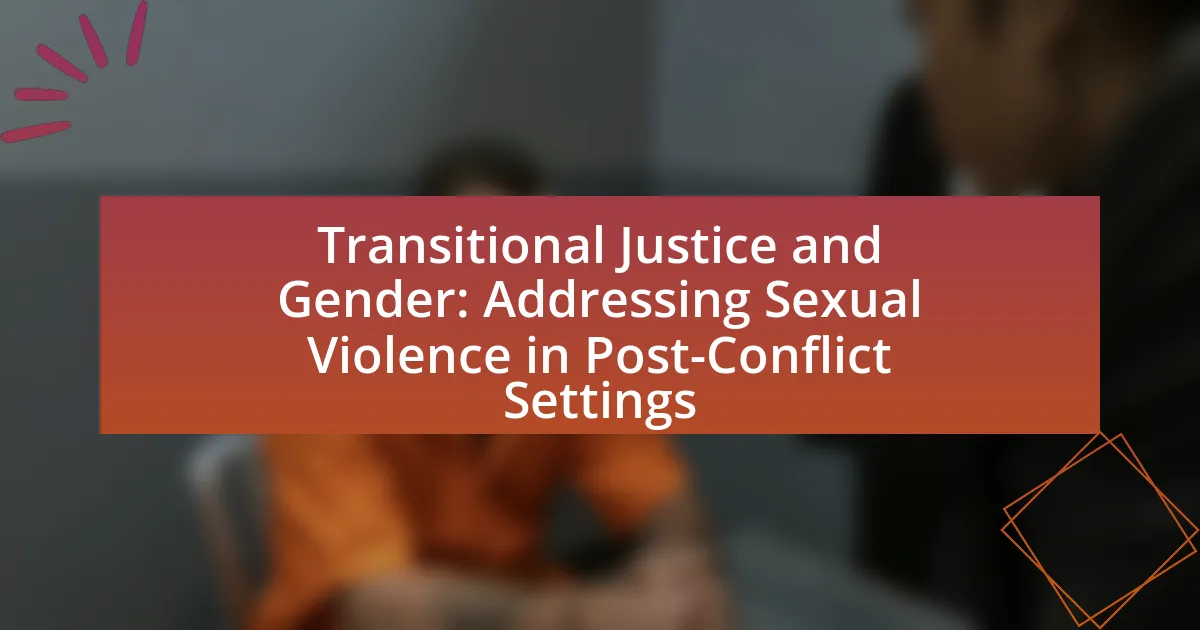The article examines the legal challenges faced in implementing transitional justice within authoritarian regimes, highlighting issues such as the lack of political will, insufficient legal frameworks, and the manipulation of laws to protect perpetrators. It emphasizes the importance of transitional justice in addressing past human rights violations and fostering accountability, which is essential for rebuilding trust in governance. Key principles of transitional justice, including accountability, truth-seeking, reparations, and institutional reform, are discussed, along with the differences in approach between authoritarian and democratic contexts. The article also explores specific legal obstacles, the role of judicial independence, and the impact of political factors on transitional justice processes, while suggesting mechanisms for overcoming these challenges through local reforms and international support.
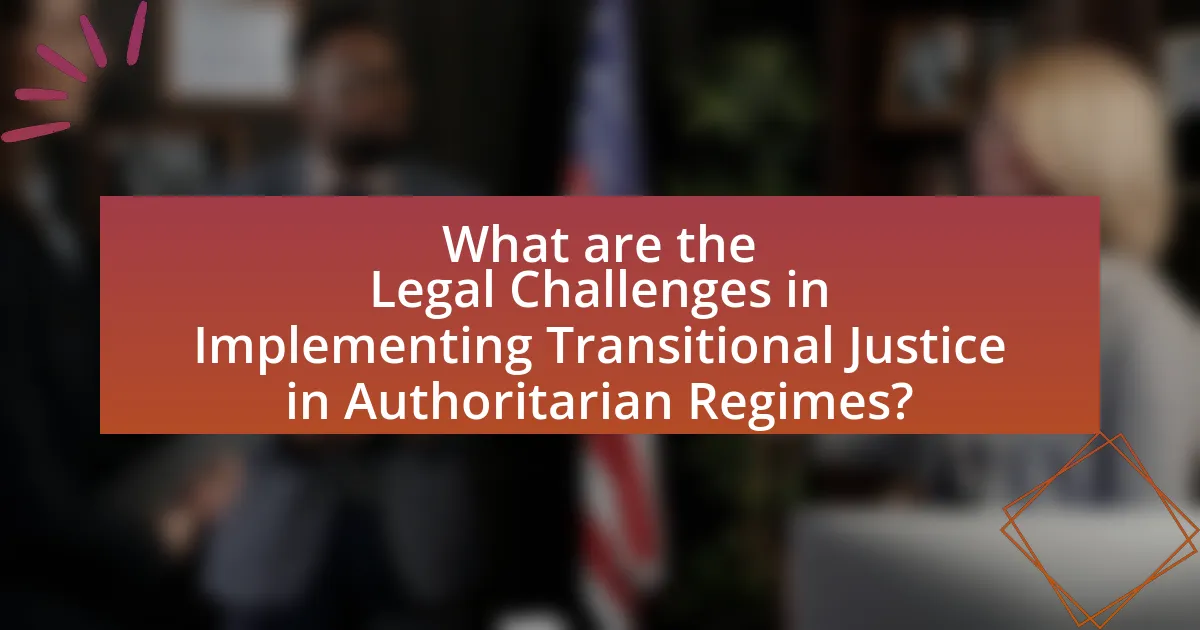
What are the Legal Challenges in Implementing Transitional Justice in Authoritarian Regimes?
The legal challenges in implementing transitional justice in authoritarian regimes include the lack of political will, insufficient legal frameworks, and the potential for backlash from powerful elites. Authoritarian governments often resist accountability measures due to fear of losing power, which undermines the establishment of necessary legal structures for transitional justice. For instance, in countries like Syria and Venezuela, existing laws may be manipulated to protect perpetrators rather than facilitate justice. Additionally, the absence of independent judicial systems in these regimes complicates the enforcement of transitional justice mechanisms, as courts may be co-opted by the state to serve political interests rather than uphold justice.
Why is Transitional Justice Important in Authoritarian Contexts?
Transitional justice is important in authoritarian contexts because it addresses past human rights violations and fosters accountability, which is crucial for rebuilding trust in governance. In authoritarian regimes, where state-sponsored violence and repression are prevalent, transitional justice mechanisms such as truth commissions and reparations can help victims seek recognition and justice. For instance, the Truth and Reconciliation Commission in South Africa played a significant role in addressing the atrocities of apartheid, demonstrating how transitional justice can facilitate societal healing and promote democratic values. By confronting the legacy of oppression, transitional justice not only aids in individual healing but also contributes to the establishment of rule of law and the prevention of future abuses, thereby reinforcing the legitimacy of emerging democratic institutions.
What are the key principles of Transitional Justice?
The key principles of Transitional Justice include accountability, truth-seeking, reparations, and institutional reform. Accountability ensures that perpetrators of human rights violations are held responsible, which is essential for restoring trust in the rule of law. Truth-seeking involves uncovering the facts about past abuses, often through truth commissions, to acknowledge victims’ experiences and promote healing. Reparations provide compensation and recognition to victims, addressing the harm suffered and facilitating their reintegration into society. Institutional reform focuses on transforming state institutions to prevent future abuses, ensuring that justice systems are fair and effective. These principles are foundational in addressing the legacies of authoritarian regimes and fostering sustainable peace.
How does Transitional Justice differ in authoritarian regimes compared to democratic ones?
Transitional Justice in authoritarian regimes primarily focuses on maintaining the regime’s stability and legitimacy, while in democratic contexts, it aims to promote accountability, reconciliation, and the rule of law. Authoritarian regimes often implement selective justice, targeting political opponents and dissenters, which undermines genuine accountability and can perpetuate cycles of violence. In contrast, democratic regimes typically emphasize comprehensive approaches that include truth commissions, reparations, and judicial processes to address past human rights violations, as seen in countries like South Africa post-apartheid. This difference is evident in the varying degrees of public participation and transparency, with democratic processes generally allowing for greater civic engagement and scrutiny compared to the top-down, controlled narratives prevalent in authoritarian settings.
What specific legal obstacles arise in authoritarian regimes?
Authoritarian regimes face specific legal obstacles that hinder the implementation of transitional justice. These obstacles include the lack of an independent judiciary, which undermines the rule of law and prevents fair trials; the absence of legal frameworks for accountability, making it difficult to prosecute human rights violations; and the suppression of civil society, which limits public participation and advocacy for justice. For instance, in countries like North Korea, the government controls the legal system, resulting in arbitrary detentions and a lack of legal recourse for victims. These factors collectively obstruct efforts to achieve justice and accountability in authoritarian contexts.
How do existing laws hinder the implementation of Transitional Justice?
Existing laws hinder the implementation of Transitional Justice by creating legal barriers that protect perpetrators of human rights violations and limit accountability. For instance, amnesty laws often prevent prosecution of individuals responsible for atrocities, thereby undermining efforts to achieve justice and reconciliation. Additionally, legal frameworks may lack provisions for victim participation or reparations, further marginalizing those affected by past abuses. In authoritarian regimes, laws can be manipulated to suppress dissent and maintain the status quo, obstructing the establishment of truth commissions or other mechanisms essential for Transitional Justice. These legal obstacles ultimately impede the pursuit of justice, accountability, and societal healing.
What role do judicial independence and corruption play in these challenges?
Judicial independence is crucial for addressing legal challenges in implementing transitional justice in authoritarian regimes, as it ensures that courts can operate free from political influence and corruption. When judicial systems lack independence, they become susceptible to manipulation by the ruling authorities, which undermines the rule of law and the fair administration of justice. Corruption further exacerbates these challenges by eroding public trust in legal institutions and allowing impunity for human rights violations. For instance, in countries like Venezuela, the judiciary has been co-opted by the government, leading to a failure in holding perpetrators accountable for abuses, thereby obstructing transitional justice efforts.
How do political factors influence legal challenges in Transitional Justice?
Political factors significantly influence legal challenges in Transitional Justice by shaping the legal framework and the willingness of authorities to engage with justice processes. In authoritarian regimes, political leaders often prioritize stability and control over accountability, leading to legal obstacles such as restrictive laws, lack of judicial independence, and suppression of dissent. For instance, in countries like Myanmar, the military’s influence over the judiciary has hindered the prosecution of human rights violations, demonstrating how political power dynamics can obstruct legal recourse. Furthermore, political considerations may result in selective enforcement of laws, where only certain cases are pursued based on their alignment with the regime’s interests, thereby undermining the overall effectiveness of Transitional Justice mechanisms.
What impact do power dynamics have on legal frameworks for Transitional Justice?
Power dynamics significantly influence legal frameworks for Transitional Justice by determining which narratives are prioritized and whose rights are recognized. In authoritarian regimes, the ruling elite often manipulate legal structures to maintain control, undermining accountability for past abuses. For instance, in countries like Syria, the government has utilized legal mechanisms to legitimize its actions while suppressing dissent, thereby obstructing genuine transitional justice efforts. This manipulation creates a legal environment where victims’ voices are marginalized, and perpetrators evade justice, ultimately hindering the establishment of a fair and effective transitional justice process.
How do authoritarian leaders manipulate legal systems to resist Transitional Justice?
Authoritarian leaders manipulate legal systems to resist Transitional Justice by enacting laws that undermine accountability and by controlling judicial processes to protect themselves and their allies. They often create legal frameworks that grant immunity to perpetrators of human rights violations, effectively shielding them from prosecution. For instance, in countries like Syria and Venezuela, leaders have enacted amnesty laws that prevent the investigation and prosecution of state-sponsored violence. Additionally, authoritarian regimes frequently appoint loyalists to key judicial positions, ensuring that legal decisions favor the regime’s interests and obstruct any attempts at justice. This manipulation of the legal system not only delays justice but also perpetuates a culture of impunity, making it difficult for victims to seek redress and for society to heal.
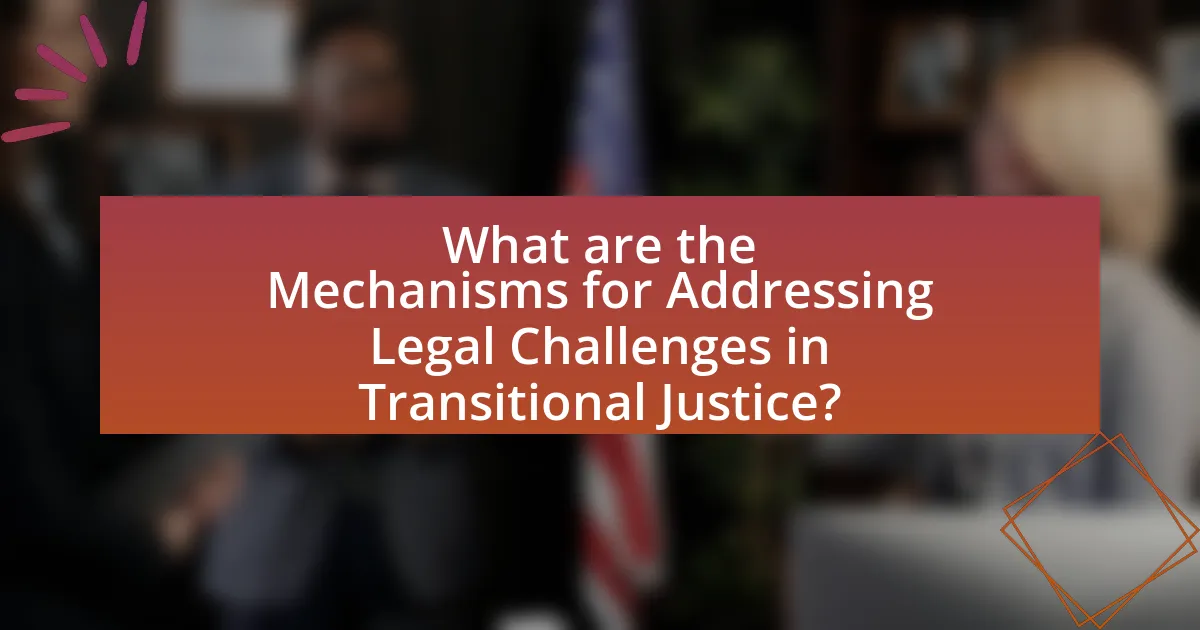
What are the Mechanisms for Addressing Legal Challenges in Transitional Justice?
Mechanisms for addressing legal challenges in transitional justice include truth commissions, legal reforms, and international tribunals. Truth commissions facilitate the documentation of human rights violations and promote accountability by providing a platform for victims to share their experiences. Legal reforms are essential for aligning national laws with international human rights standards, ensuring that perpetrators of past abuses can be prosecuted. International tribunals, such as the International Criminal Court, provide a judicial avenue for addressing crimes against humanity and war crimes when national systems fail to act. These mechanisms collectively aim to restore justice and promote reconciliation in societies transitioning from authoritarian rule.
How can international law support Transitional Justice in authoritarian regimes?
International law can support Transitional Justice in authoritarian regimes by providing frameworks for accountability, promoting human rights standards, and facilitating international cooperation. These frameworks, such as the International Criminal Court (ICC) and various human rights treaties, establish legal obligations for states to investigate and prosecute serious crimes like genocide and crimes against humanity. For instance, the ICC’s Rome Statute empowers the court to intervene when national jurisdictions fail to hold perpetrators accountable, thereby reinforcing the principle of accountability in transitional justice processes. Additionally, international law encourages the establishment of truth commissions and reparations programs, which are essential components of transitional justice aimed at addressing past abuses and fostering reconciliation. By aligning national legal systems with international norms, authoritarian regimes can be pressured to implement reforms that support justice and accountability, ultimately contributing to the rule of law and democratic governance.
What are the mechanisms of international accountability?
The mechanisms of international accountability include international courts, tribunals, and monitoring bodies that hold states and individuals accountable for violations of international law. These mechanisms, such as the International Criminal Court (ICC) and ad hoc tribunals like the International Criminal Tribunal for the former Yugoslavia (ICTY), provide legal frameworks for prosecuting war crimes, genocide, and crimes against humanity. Additionally, treaty bodies and special rapporteurs established by the United Nations monitor compliance with human rights obligations, offering recommendations and reporting violations. These mechanisms are essential for enforcing international norms and ensuring justice in contexts where domestic systems may be ineffective or compromised.
How can international organizations assist in overcoming legal barriers?
International organizations can assist in overcoming legal barriers by providing technical assistance, facilitating dialogue, and promoting legal reforms. For instance, organizations like the United Nations and the International Criminal Court offer expertise in drafting legislation that aligns with international human rights standards, which can help countries reform their legal frameworks. Additionally, these organizations can create platforms for dialogue among stakeholders, fostering collaboration between governments, civil society, and legal experts to address specific legal challenges. Evidence of this effectiveness can be seen in various transitional justice initiatives, such as the UN’s support for legal reforms in post-conflict countries, which have led to the establishment of more robust legal systems that uphold justice and accountability.
What role do local legal reforms play in facilitating Transitional Justice?
Local legal reforms are crucial in facilitating Transitional Justice by establishing a legal framework that addresses past human rights violations and promotes accountability. These reforms enable the creation of mechanisms such as truth commissions, reparations programs, and judicial processes that are essential for acknowledging victims’ rights and fostering societal healing. For instance, in South Africa, the Truth and Reconciliation Commission was supported by legal reforms that allowed for the investigation of apartheid-era crimes, demonstrating how local legal changes can empower transitional justice initiatives. Such reforms also help to build public trust in legal institutions, which is vital for the successful implementation of transitional justice in authoritarian regimes.
How can grassroots movements influence legal changes?
Grassroots movements can influence legal changes by mobilizing public support, raising awareness, and advocating for policy reforms. These movements often highlight social injustices and create pressure on lawmakers to respond to the demands of the community. For instance, the Civil Rights Movement in the United States led to significant legal changes, such as the Civil Rights Act of 1964, by organizing protests, engaging in legal battles, and fostering public discourse around racial equality. This demonstrates that grassroots activism can effectively challenge existing laws and promote new legislation that aligns with the movement’s goals.
What are the best practices for implementing legal reforms in authoritarian contexts?
The best practices for implementing legal reforms in authoritarian contexts include fostering inclusive dialogue, ensuring stakeholder engagement, and leveraging international support. Inclusive dialogue allows for the participation of various societal groups, which can enhance legitimacy and acceptance of reforms. Engaging stakeholders, such as civil society organizations and legal experts, ensures that reforms address the needs and concerns of the population. Additionally, international support can provide resources and expertise, as seen in cases like Tunisia, where external actors assisted in drafting new legal frameworks post-revolution. These practices contribute to creating a more resilient legal system capable of withstanding authoritarian pressures.
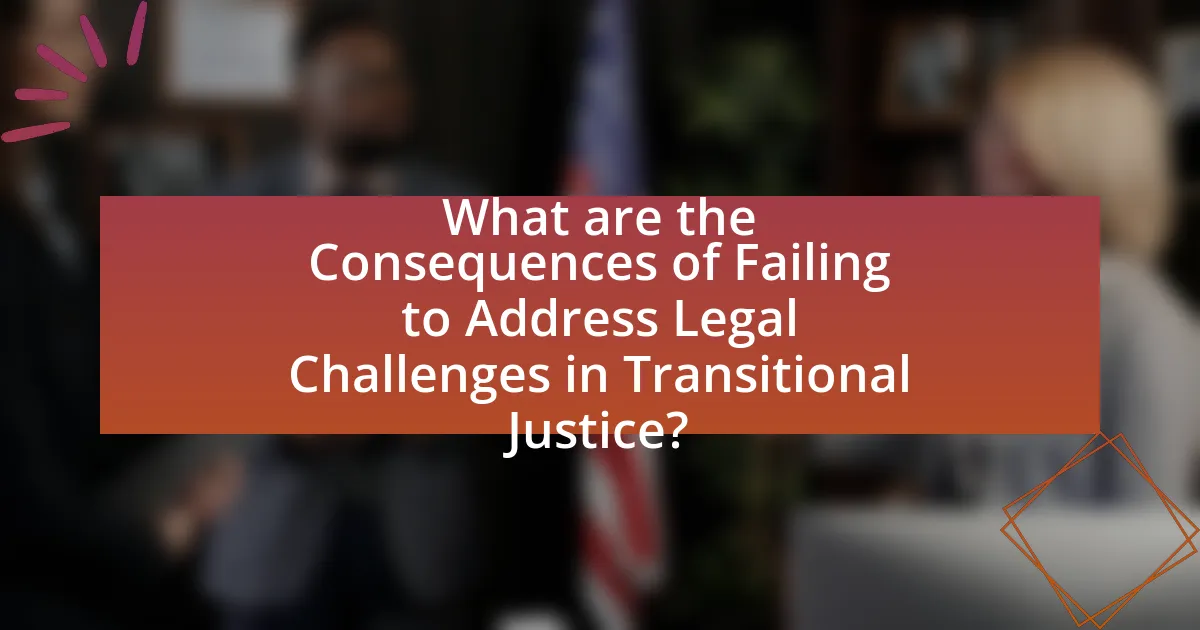
What are the Consequences of Failing to Address Legal Challenges in Transitional Justice?
Failing to address legal challenges in transitional justice can lead to prolonged impunity for perpetrators of human rights violations. This lack of accountability undermines the rule of law and can perpetuate cycles of violence and conflict, as seen in countries like Argentina and Rwanda, where unaddressed grievances have fueled ongoing tensions. Additionally, the absence of legal redress can erode public trust in governmental institutions, leading to social unrest and a weakened civil society. Historical evidence indicates that without legal mechanisms to address past injustices, societies struggle to achieve reconciliation and stability, as demonstrated in post-apartheid South Africa, where unresolved issues continue to affect social cohesion.
What are the potential impacts on society if legal challenges remain unresolved?
Unresolved legal challenges can lead to significant societal impacts, including the perpetuation of injustice and the erosion of public trust in legal institutions. When legal disputes remain unsettled, victims of human rights abuses may feel marginalized and powerless, which can foster social unrest and conflict. Historical examples, such as the aftermath of authoritarian regimes in Latin America, illustrate that unresolved legal issues can hinder reconciliation efforts and prevent societies from moving forward. Additionally, the lack of accountability for perpetrators can embolden further violations, creating a cycle of impunity that destabilizes communities and undermines the rule of law.
How does the lack of Transitional Justice affect victims and communities?
The lack of Transitional Justice severely impacts victims and communities by perpetuating cycles of violence and impunity. Without mechanisms for accountability, victims are denied recognition and redress, leading to ongoing trauma and social fragmentation. For instance, in post-conflict societies like Rwanda, the absence of effective Transitional Justice measures has resulted in unresolved grievances, which can fuel further conflict and hinder reconciliation efforts. Studies show that communities lacking Transitional Justice experience higher rates of violence and instability, as unresolved injustices create an environment of distrust and resentment.
What are the long-term implications for rule of law and governance?
The long-term implications for rule of law and governance in authoritarian regimes undergoing transitional justice include the potential for weakened legal institutions and diminished public trust in governance. When transitional justice processes are inadequately implemented, they can lead to a lack of accountability for past abuses, fostering a culture of impunity. This undermines the rule of law, as citizens may perceive the legal system as biased or ineffective. Historical examples, such as post-apartheid South Africa, illustrate that successful transitional justice can strengthen legal frameworks and enhance governance, while failures in similar contexts often result in ongoing human rights violations and instability. Thus, the effectiveness of transitional justice directly influences the durability of rule of law and governance in these regimes.
What strategies can be employed to navigate legal challenges effectively?
To navigate legal challenges effectively in implementing transitional justice in authoritarian regimes, employing a multi-faceted approach is essential. This includes engaging in thorough legal research to understand the specific laws and regulations governing transitional justice within the context of the regime, as well as leveraging international legal frameworks that may provide support or guidance. Additionally, building coalitions with local and international human rights organizations can enhance advocacy efforts and provide necessary resources.
Evidence of the effectiveness of these strategies can be seen in various transitional justice initiatives, such as the South African Truth and Reconciliation Commission, which utilized legal frameworks and international support to address past human rights violations. Furthermore, studies indicate that collaborative approaches often lead to more sustainable legal outcomes in challenging political environments.
What are the key considerations for practitioners working in authoritarian contexts?
Practitioners working in authoritarian contexts must prioritize safety, adaptability, and cultural sensitivity. Safety is paramount, as practitioners face risks of repression or retaliation from state authorities; thus, they should develop strategies to protect themselves and their collaborators. Adaptability is crucial, as practitioners must navigate complex political landscapes and adjust their approaches based on the shifting dynamics of power and public sentiment. Cultural sensitivity is essential for effective engagement, as understanding local norms and values can facilitate trust-building and cooperation with communities. These considerations are supported by case studies, such as the experiences of human rights organizations in countries like Myanmar and Venezuela, where practitioners have successfully implemented strategies that account for these factors while addressing transitional justice issues.
How can collaboration between local and international actors enhance outcomes?
Collaboration between local and international actors can enhance outcomes by combining local knowledge with global resources and expertise. Local actors possess an understanding of cultural contexts and community needs, which is crucial for effective implementation of transitional justice initiatives. For instance, the International Center for Transitional Justice has documented cases where local involvement led to more culturally relevant and accepted justice mechanisms, thereby increasing community trust and participation. Additionally, international actors can provide technical assistance, funding, and a broader perspective on best practices, which can help overcome legal and institutional barriers faced in authoritarian regimes. This synergy not only improves the effectiveness of transitional justice processes but also fosters accountability and reconciliation, as evidenced by successful collaborations in countries like South Africa and Tunisia.
